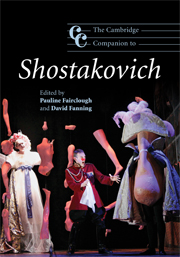Book contents
- Frontmatter
- Introduction
- PART I Instrumental works
- PART II Music for stage and screen
- PART III Vocal and choral works
- PART IV Performance, theory, reception
- 12 A political football: Shostakovich reception in Germany
- 13 The rough guide to Shostakovich's harmonic language
- 14 Shostakovich on record
- 15 Jewish existential irony as musical ethos in the music of Shostakovich
- Notes
- Select bibliography
- Index
12 - A political football: Shostakovich reception in Germany
from PART IV - Performance, theory, reception
Published online by Cambridge University Press: 28 September 2011
- Frontmatter
- Introduction
- PART I Instrumental works
- PART II Music for stage and screen
- PART III Vocal and choral works
- PART IV Performance, theory, reception
- 12 A political football: Shostakovich reception in Germany
- 13 The rough guide to Shostakovich's harmonic language
- 14 Shostakovich on record
- 15 Jewish existential irony as musical ethos in the music of Shostakovich
- Notes
- Select bibliography
- Index
Summary
From my previous money I still have forty dollars, so I decided to go to Berlin. I persuaded Oborin to come, too. He can speak the language, albeit not too well. Berlin is an enchanting city. I couldn’t imagine anywhere like it.
Judging by the excitable nature of the letter that Shostakovich wrote to his mother from Berlin on 8 February 1927, the young composer's eagerness to expend precious financial resources on a week-long trip to the German capital was merely an act of impulse born out of frustration at his lack of success at the Warsaw Chopin Piano Competition. On further reflection, however, there seems to have been a much greater degree of calculation in his behaviour. No doubt, like many other young Soviet composers, Shostakovich was fascinated by the increasing amount of new German music that was being performed in his native country in the mid-1920s. For this reason he would have seized any opportunity to experience at first hand the cultural environment from which such compositions emanated. Perhaps his desire to visit Berlin was also stimulated in the previous month by the invitation to play through his First Symphony to the conductor Bruno Walter, who was giving concerts in Leningrad at the time.
Shostakovich's encounter with Walter proved particularly decisive. Although an arch conservative when it came to the promotion of contemporary music, Walter was evidently so impressed by the qualities of the symphony that he agreed at once to programme the work in his next season of concerts with the Berlin Philharmonic Orchestra. The auspicious German premiere took place on 6 February 1928, its overwhelming success serving to launch Shostakovich's name in the West as a composer of extraordinary promise.
- Type
- Chapter
- Information
- The Cambridge Companion to Shostakovich , pp. 285 - 297Publisher: Cambridge University PressPrint publication year: 2008
- 1
- Cited by

